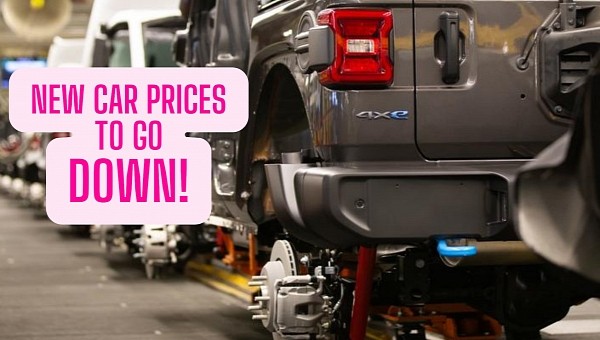Car prices have reached ridiculous levels in the last three years, particularly fueled by constrained inventory, but the industry is expected to return to pre-2020 marketing tactics in the second half of 2023.
Stellantis chief executive Carlos Tavares says the fight for customers will force carmakers to return to typical incentives, including price cuts and major discounts.
This is all going to happen later this year, Tavares says, especially as car production is returning to normal levels.
The semiconductor shortage that emerged in 2020 wreaked havoc in the automotive industry, eventually forcing carmakers to suspend production or ship vehicles without certain systems. With order books full, companies prioritized their most profitable models, eventually improving their margins substantially.
The end of the chip shortage is already on the radar, and car production is projected to reach pre-2020 levels by the end of the year. As such, carmakers would once again fight for customers, and the typical tactics include price cuts and discounts.
This is good news for customers, especially as prices have skyrocketed in the last 12 months, fueled not only by the lack of chips or other parts but also by inflation. But with production gaining traction, carmakers still need to sell the vehicles they build, so lower prices and reduced margins could become their only options.
Sure enough, anticipating the end of the chip shortage still seems to be a risky idea.
The world’s largest car manufacturers don’t expect the semiconductor crunch to be resolved this year. General Motors previously warned that the global inventory could remain constrained in 2023, explaining that particular struggles might be encountered in 2024 as well.
Toyota also expects this year to cause additional challenges from a semiconductor and component perspective. The company anticipates a 10 percent impact on its annual production target, emphasizing that the semiconductor market continues to be impacted by instability and uncertainty.
Tech giant Intel was among the first companies to indicate the chip shortage wouldn’t come to an end earlier than 2024. The firm said the semiconductor struggles would be over in 2023 only for electronics manufacturers, including companies building PCs and phones. Automakers, Intel said, would still battle a constrained chip inventory for one more year.
Sales of PCs and smartphones have already declined in the last quarter, and chipmakers are investing in retooling for automotive chip production. The next generation of cars is expected to rely heavily on smart chips, especially as the push for electric vehicles and autonomous vehicles is gaining traction. As a result, chipmakers try to be prepared for the chip revolution expected in the car sector, with more chip plants to open their doors in the U.S. and Europe by 2027.
Time will tell if Stellantis’ forecast (requires subscription) is accurate, but given the skyrocketing inflation and the rising costs of living, car sales are very likely to be heavily impacted in 2023 without an aggressive price strategy.
This is all going to happen later this year, Tavares says, especially as car production is returning to normal levels.
The semiconductor shortage that emerged in 2020 wreaked havoc in the automotive industry, eventually forcing carmakers to suspend production or ship vehicles without certain systems. With order books full, companies prioritized their most profitable models, eventually improving their margins substantially.
The end of the chip shortage is already on the radar, and car production is projected to reach pre-2020 levels by the end of the year. As such, carmakers would once again fight for customers, and the typical tactics include price cuts and discounts.
This is good news for customers, especially as prices have skyrocketed in the last 12 months, fueled not only by the lack of chips or other parts but also by inflation. But with production gaining traction, carmakers still need to sell the vehicles they build, so lower prices and reduced margins could become their only options.
Sure enough, anticipating the end of the chip shortage still seems to be a risky idea.
The world’s largest car manufacturers don’t expect the semiconductor crunch to be resolved this year. General Motors previously warned that the global inventory could remain constrained in 2023, explaining that particular struggles might be encountered in 2024 as well.
Toyota also expects this year to cause additional challenges from a semiconductor and component perspective. The company anticipates a 10 percent impact on its annual production target, emphasizing that the semiconductor market continues to be impacted by instability and uncertainty.
Tech giant Intel was among the first companies to indicate the chip shortage wouldn’t come to an end earlier than 2024. The firm said the semiconductor struggles would be over in 2023 only for electronics manufacturers, including companies building PCs and phones. Automakers, Intel said, would still battle a constrained chip inventory for one more year.
Sales of PCs and smartphones have already declined in the last quarter, and chipmakers are investing in retooling for automotive chip production. The next generation of cars is expected to rely heavily on smart chips, especially as the push for electric vehicles and autonomous vehicles is gaining traction. As a result, chipmakers try to be prepared for the chip revolution expected in the car sector, with more chip plants to open their doors in the U.S. and Europe by 2027.
Time will tell if Stellantis’ forecast (requires subscription) is accurate, but given the skyrocketing inflation and the rising costs of living, car sales are very likely to be heavily impacted in 2023 without an aggressive price strategy.











